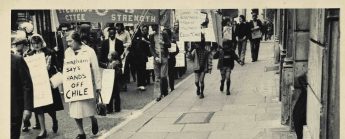
Matthew Francis
On the final afternoon of last year’s Rethinking Modern British Studies conference a small group gathered in a corner of the University of Birmingham’s Arts Building to sing the Political History Blues. The panel – subtitled Whatever Happened To Political History? – explored the ‘strange dearth’ of political history, and concluded that political historians had ‘drawn back from the methodological barricades’.
The panellists had a point. If Rethinking Modern British Studies was, in many respects, an indication of the present vitality of contemporary British history, historians working on aspects of what might be thought of as conventional politics – that is, on high politics, on political parties, on think-tanks, and so forth – were notable for the relatively small part of the programme they occupied. The headline acts of the conference were for the most part working in the fields of social or cultural history; political history was present at the conference, but was confined to rather smaller stages. Political historians, it seemed, had not been doing very much ‘rethinking’.
The clearest evidence of this is perhaps in the approaches which inform today’s political history. Twenty years ago a series of new works – James Vernon’s Politics and the People, Jon Lawrence and Miles Taylor’s Party, State and Society – proposed a new cultural history of politics, an approach which was influenced by post-modernism and which sought to understand politics as a far broader and more complex field of activity than had hitherto been the case. There has, however, been little meaningful methodological development in the discipline since the mid-1990s. While political historians continue to produce work which sheds important light on the past, and continues to dominate many of the popular histories of the twentieth century, there is little sign that the discipline as a whole is engaged in a process of innovation or attempting to expand its methodological horizons.
The study of politics in other disciplines is in a similar state of disrepair. Mick Moran, in a recent post for the LSE Politics and Policy blog, has written of the failure of Political Science to respond to the intellectual challenges posed by the 2007-8 financial crisis. The crisis, Moran writes, posed significant questions about the politics of financial markets and of banking regulation. Yet analysis of the crisis has largely remained the preserve of those working in neighbouring disciplines – international political economy, economics – rather than political scientists. The intellectual challenges posed by the financial crisis have been largely ignored by political science, which has ‘sail[ed] blithely and complacently on’. The roots of this failure, Moran argues, ‘lie in the historical mission of the discipline, and in its established intellectual practice’. The development of political science as ‘the discipline of the state’ created the conditions in which the politics of the financial crisis was defined as the business of others. While the launch of the Political Studies Association’s new History and Politics group represents an encouraging step towards collaboration, political historians and political scientists too often remain trapped within the intellectual confines of their own disciplines.
Breaking Boundaries seeks to break the impasse. Sponsored by the University of Birmingham’s Centre for Modern British Studies and the University of Nottingham’s Centre for British Politics, the conference seeks to bring together student to politics working in different (but neighbouring) disciplines to encourage intellectual exchange and to inspire new approaches. We hope in this was to inspire serious ‘rethinking’ among political historians, and, perhaps, to return political history to centre stage once again.
